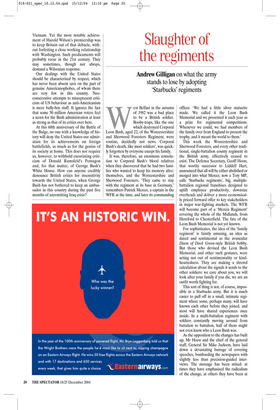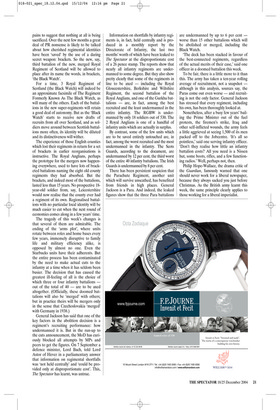Slaughter of the regiments
Andrew Gilligan on what the army stands to lose by adopting ‘Starbucks’ regiments West Belfast in the autumn of 1982 was a bad place to be a British soldier. Booby-traps, like the one which destroyed Corporal Leon Bush, aged 22, of the Worcestershire and Sherwood Foresters Regiment, were routine, decidedly not news. Corporal Bush’s death, like most soldiers’, was quickly forgotten by everyone except his family.
It was, therefore, an enormous consolation to Corporal Bush’s blood relatives when they discovered that he had two families who wanted to keep his memory alive: themselves, and the Worcestershire and Sherwood Foresters. ‘They came to stay with the regiment at its base in Germany,’ remembers Patrick Mercer, a captain in the WFR at the time, and later its commanding officer. ‘We had a little silver statuette made. We called it the Leon Bush Memorial and we presented it each year as a prize for regimental competitions. Whenever we could, we had members of the family over from England to present the trophy, and it meant the world to them.’ This week the Worcestershire and Sherwood Foresters, and every other traditional, single-battalion county regiment in the British army, effectively ceased to exist. The Defence Secretary, Geoff Hoon, that worthy successor to Liddell Hart, announced that all will be either abolished or merged into what Mercer, now a Tory MP, calls ‘Starbucks regiments’, big, multiplebattalion regional franchises designed to uplift employee productivity, downsize overheads and deliver a more economically priced forward offer to key stakeholders in major war-fighting markets. The WFR will become part of a ‘Mercia Regiment’ covering the whole of the Midlands, from Hereford to Chesterfield. The fate of the Leon Bush Memorial is not yet known.
For sophisticates, the idea of the ‘family regiment’ is faintly amusing, an idea as dated and sentimental as the avuncular Dixon of Dock Green-style British bobby. But those who devised the Leon Bush Memorial, and other such gestures, were acting not out of sentimentality or kindheartedness. They are making a shrewd calculation about the signals it sends to the other soldiers: we care about you, we will look after your family if you die, we are an outfit worth fighting for.
This sort of thing is not, of course, impossible in a Starbucks army. But it is much easier to pull off in a small, intimate regiment where some, perhaps many, will have known each other before they joined, and most will have shared experiences once inside. In a multi-battalion regiment with soldiers constantly moving around from battalion to battalion, half of them might not even know who a Leon Bush was.
As the opposition to the changes has built up, Mr Hoon and the chief of the general staff, General Sir Mike Jackson, have laid down a devastating barrage of covering speeches, bombarding the newspapers with slightly less than precision-guided interviews. The message has been mixed: at times they have emphasised the radicalism of the change, at others they have been at pains to suggest that nothing at all is being sacrificed. Over the next few months a great deal of PR nonsense is likely to be talked about how cherished regimental identities have been ‘saved’ by the use of a daring secret weapon: brackets. So the new, say, third battalion of the new, merged Royal Regiment of Scotland will be allowed to place after its name the words, in brackets, ‘the Black Watch’.
For a time, 3 Royal Regiment of Scotland (the Black Watch) will indeed be an approximate facsimile of The Regiment Formerly Known As The Black Watch, as will many of the others. Each of the battalions in the new super-regiments will retain a good deal of autonomy. But as the ‘Black Watch’ starts to receive new drafts of recruits from all over Scotland, and as soldiers move around between Scottish battalions more often, its identity will be diluted and its distinctiveness will wither.
The experience of those English counties which lost their regiments in return for a set of brackets in earlier reorganisations is instructive. The Royal Anglians, perhaps the prototype for the mergers now happening everywhere, used to have lots of bracketed battalions naming the eight old county regiments they had absorbed. But the brackets, and indeed most of the battalions, lasted less than 15 years. No prospective 18year-old soldier from, say, Leicestershire would now realise that the county ever had a regiment of its own. Regionalised battalions with no particular local identity will be much easier to cut when the next round of economies comes along in a few years’ time.
The tragedy of this week’s changes is that several of them are admirable. The ending of the ‘arms plot’, where units rotate between roles and home bases every few years, immensely disruptive to family life and military efficiency alike, is opposed by almost no one. Even the Starbucks units have their adherents. But the entire process has been contaminated by the need to make actual cuts to the infantry at a time when it has seldom been busier. The decision that has caused the greatest ill-feeling of all is the choice of which three or four infantry battalions out of the total of 40 — are to be axed altogether. (Officially, these doomed battalions will also be ‘merged’ with others; but in practice theirs will be mergers only in the sense that Czechoslovakia ‘merged’ with Germany in 1938.) General Jackson has said that one of the key factors in the abolition decision is a regiment’s recruiting performance: how undermanned it is. But in the run-up to the cuts announcement, the MoD has curiously blocked all attempts by MPs and peers to get the figures. On 7 September a defence minister, Lord Bach, told Lord Astor of Hever in a parliamentary answer that information on regimental shortfalls was ‘not held centrally’ and ‘could be provided only at disproportionate cost’. This, The Spectator has learnt, was untrue. Information on shortfalls by infantry regiments is, in fact, held centrally and is produced in a monthly report by the Directorate of Infantry, the last two months’ worth of which have been leaked to The Spectator at the disproportionate cost of a 26 pence stamp. The reports show that nearly all infantry regiments are undermanned to some degree. But they also show pretty clearly that some of the regiments in line to be axed — including the Royal Gloucestershire, Berkshire and Wiltshire Regiment, the second battalion of the Royal Anglians, and one of the Gurkha battalions — are, in fact, among the best recruited and the least undermanned in the entire infantry. The RGBW is undermanned by only 18 soldiers out of 530. The 2 Royal Anglians is one of a handful of infantry units which are actually in surplus.
By contrast, some of the few units which are to be saved entirely untouched are, in fact, among the worst recruited and the most undermanned in the infantry. The Scots Guards, according to the document, are undermanned by 12 per cent, the third worst of the entire 40 infantry battalions. The Irish Guards is undermanned by 8 per cent.
There has been persistent suspicion that the Parachute Regiment, another unit which will survive unscathed, has benefited from friends in high places. General Jackson is a Para. And indeed, the leaked figures show that the three Para battalions are undermanned by up to 6 per cent worse than 15 other battalions which will be abolished or merged, including the Black Watch.
‘The deck has been stacked in favour of the best-connected regiments, regardless of the actual merits of their case,’ said one officer in a doomed battalion this week.
To be fair, there is a little more to it than this. The army has taken a ten-year rolling average of recruitment, not a snapshot although in this analysis, sources say, the Paras come out even worse — and recruiting is not the only factor. General Jackson has stressed that every regiment, including his own, has been thoroughly looked at.
Nonetheless, after a busy few years’ bailing the Prime Minister out of the fuel protests, the firemen’s strike, Iraq and other self-inflicted wounds, the army feels a little aggrieved at seeing 1,500 of its men packed off to the Jobcentre. ‘It’s all so pointless,’ said one serving infantry officer. ‘Don’t they realise how little an infantry battalion costs? All you need is a Nissen hut, some boots, rifles, and a few functioning radios.’ Well, perhaps not, then.
Philip Hope-Wallace, the drama critic of the Guardian, famously warned that one should never work for a liberal newspaper, because they always sacked you just before Christmas. As the British army learnt this week, the same principle clearly applies to those working for a liberal imperialist.


















































































 Previous page
Previous page